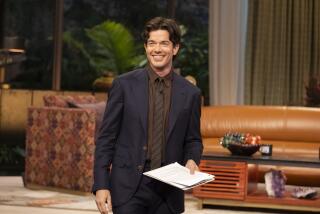Putting Soviet Leaders on the Hot Seat : Television: Angelenos get a chance to grill Gorbachev and Yeltsin on ‘Town Hall.’
- Share via
For many Americans who participated in ABC-TV’s live “Town Hall” exchange Thursday night with the two leaders of a reforming Soviet Union, the event was historic--and great TV.
“It was the most exciting minute of my life,” said Ben Stein, a former Nixon speech writer and attorney now best known to TV audiences as Fred Savage’s science teacher on “The Wonder Years.” Stein was one of two members of about 30 hand-selected Southern Californians gathered at a KABC-TV sound stage on Prospect Avenue for the hook-up between Moscow and nine U.S. cities.
The first question of the evening was asked from the KABC sound studio by actor-writer Miles Berkowitz. The Brentwood resident asked Soviet President Mikhail S. Gorbachev and Russian Federation President Boris N. Yeltsin what they would change about the other, if they could do so. Originally, he was to have asked how the two got along.
“To my horror (Peter) Jennings asked the same question just before I went on,” said Berkowitz. “I had to put a slightly different twist on it, so I came up with ‘How would you change your partner’?”
Berkowitz took some heat from others in the audience for asking a question that some thought shallow.
“I nearly fell out of my chair,” said Richard Walden, founder of the Operation California international relief organization. “I spent about four days crafting a question about the Soviets and the defense budget and the first question out of the box sounds like its off of the ‘Newlywed Game.’ ”
“Politics and history is about personalities,” said Berkowitz, a Philadelphia native who characterized himself as a kind of “Zelig” character, from the Woody Allen movie about a nobody who keeps turning up at noteworthy historical events. “Under the circumstances, I think it was an appropriate question because we have two very different personalities struggling together to do something that has never been done before in history--to totally change a superpower.” (In addition to once publicly questioning deposed Philippine leader Ferdinand Marcos, he also made waves during his college days when he asked President Jimmy Carter an embarrassing question about the switch from Cyrus Vance to Edmund Muskie to head the State Department following the aborted Iran hostage rescue attempt during the 1980 presidential campaign.)
Stein got an opportunity to ask a question about halfway into the hour-and-15-minute broadcast.
“I spent (Thursday) morning tearing out the dry wall and rusted chicken wire in my basement so I could keep rats out of my house in Malibu and, a few hours later, I’m talking to Gorbachev and Yeltsin,” said Stein. “It was astounding. I really thought I was going to have a little heart attack. What a wonderful country this is where a loser like me who has a hard time paying my MasterCard some months, gets a chance to ask Gorbachev and Yeltsin whether communism is dead.”
“I was very satisfied with Yeltsin’s answer (that communism had failed),” said Stein. “It was extraordinarily candid. I was less satisfied with Gorbachev, but then he’s more of a politician.”
Stein sold the original idea for “Amerika,” the controversial 1987 miniseries about a futuristic Soviet takeover of the U.S., to ABC. The miniseries, which was a ratings blockbuster, generated a good deal of controversy at a time when the Cold War had yet begun to show genuine signs of thawing.
Los Angeles City Councilman Zev Yaroslavsky, who sat in the audience but did not get an opportunity to question the Soviet leaders, said that others did ask his questions and that he did get the answers he wanted, including why the Soviets don’t have more women in government. One answer that floored him, he said, was Yeltsin’s refusal to simply condemn outright a relatively new Soviet organization that Yaroslavsky characterized as right-wing and anti-Semitic.
“I was flabbergasted by the way they answered the question about Pamyat,” Yaroslavsky said. “I thought it was fascinating and, to some degree, showed the character of the two individuals. Gorbachev was much more diplomatic, but suggesting that they are reforming themselves is like saying the KKK is becoming more mainstream in the U.S.”
Yaroslavsky’s ultimate assessment was akin to that of Ben Stein’s: The entire evening was remarkable and the audience quite representative under the circumstances. Others in the Los Angeles audience included actor Ed Asner, representatives of Vietnamese and Armenian activist groups, actor Eddie Albert and his son Edward Albert, who just returned from filming a movie in the Soviet Union, and Creative Artists Agency executive Steve Rivers.
“I now have no doubt that there are more people in Brentwood Park who believe in communism these days than in the Kremlin,” said Stein.
Asked about the fact that both Yeltsin and Gorbachev wore bright red ties on camera, Stein said:
“So did I. Doesn’t mean a thing. It’s this year’s power color.”
More to Read
The complete guide to home viewing
Get Screen Gab for everything about the TV shows and streaming movies everyone’s talking about.
You may occasionally receive promotional content from the Los Angeles Times.






